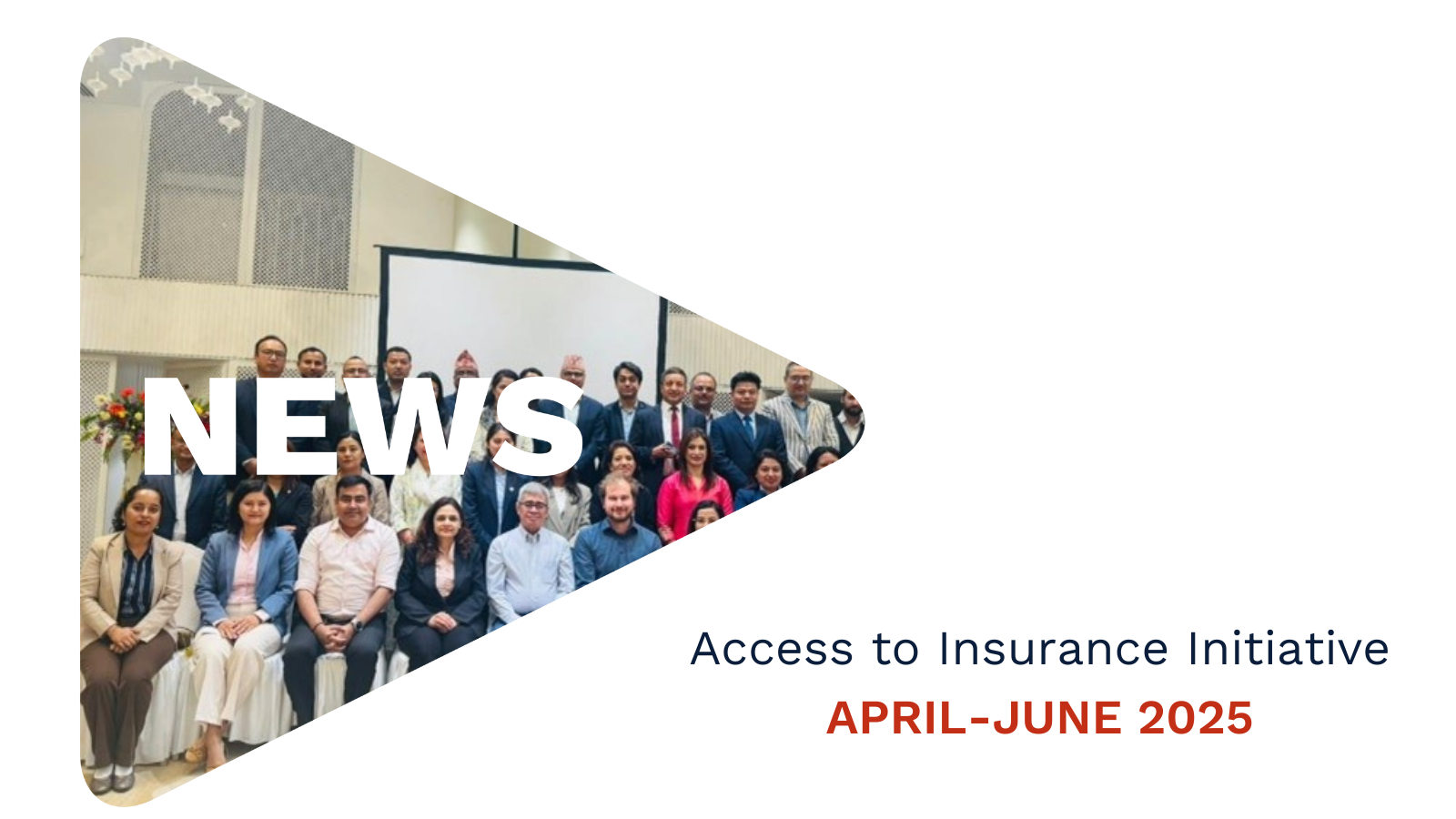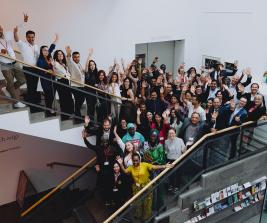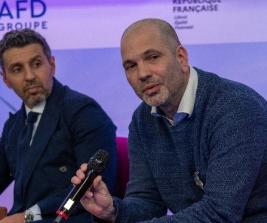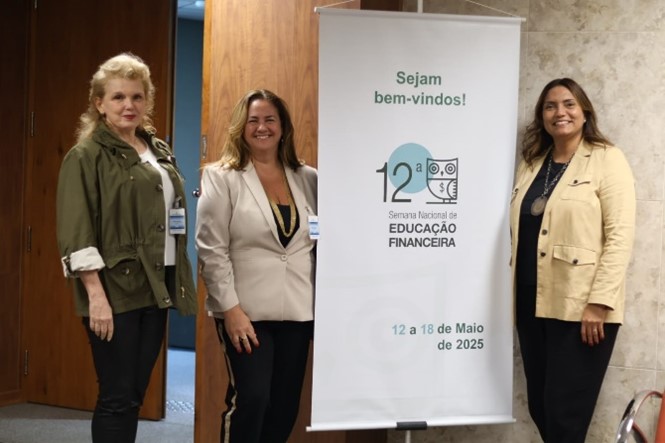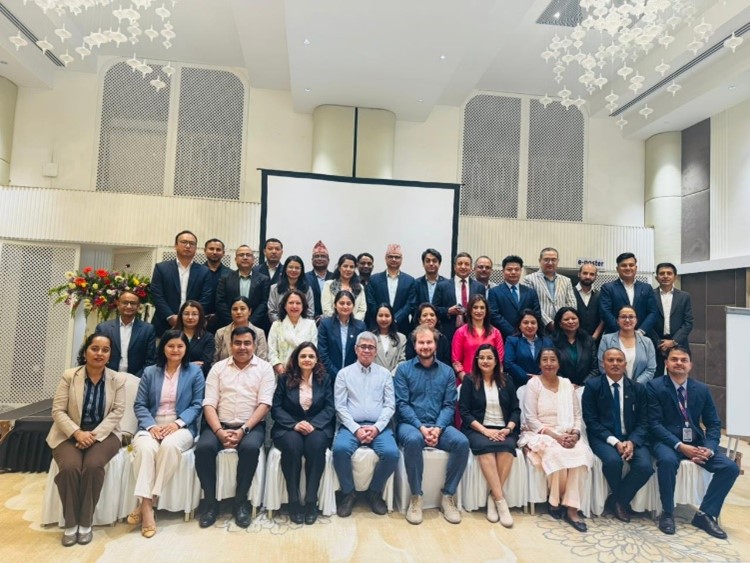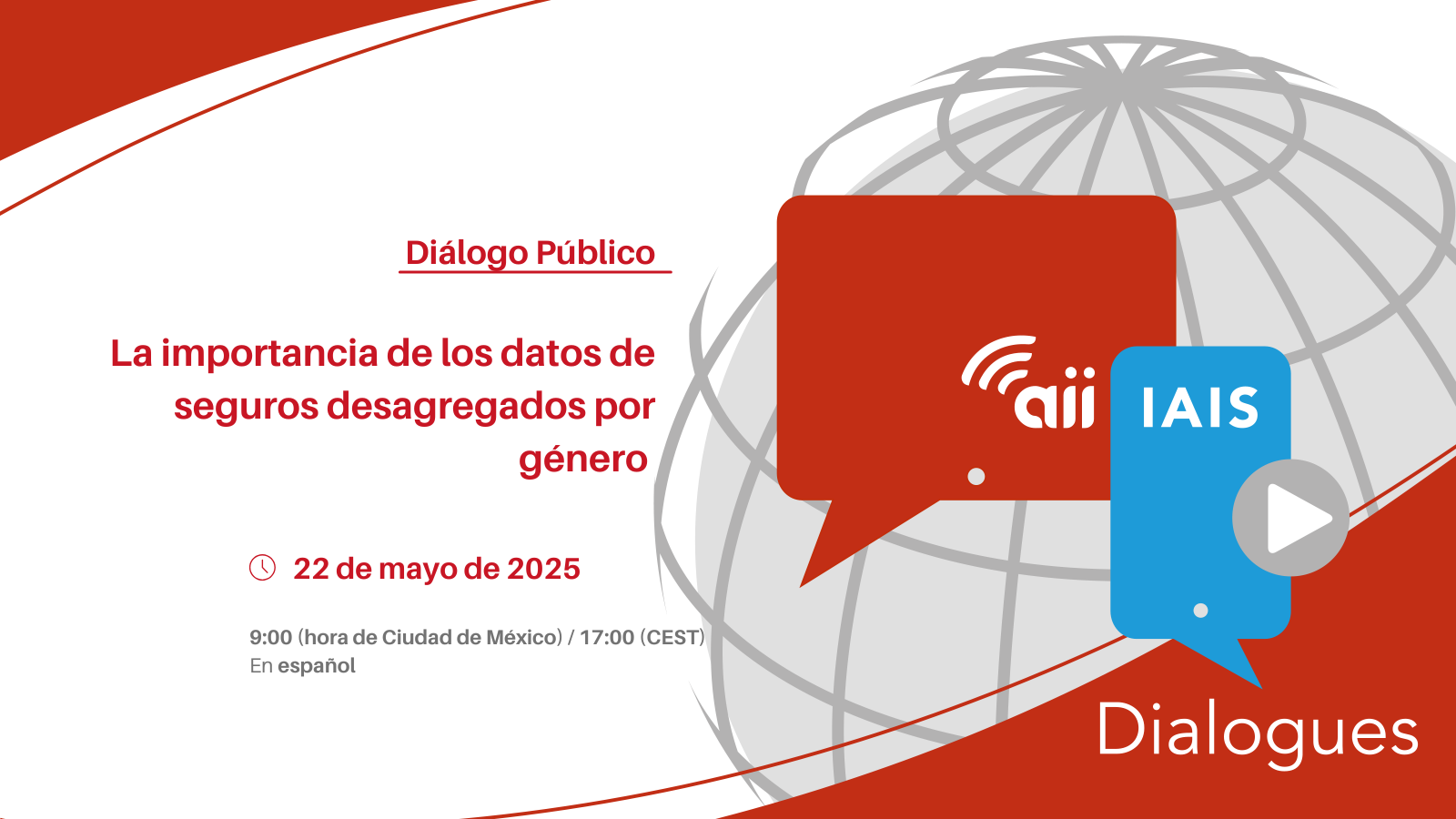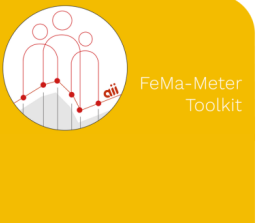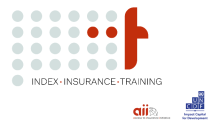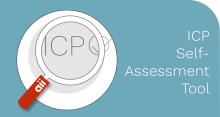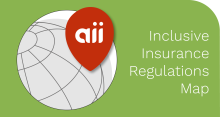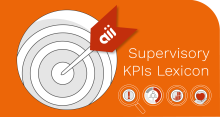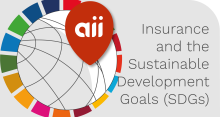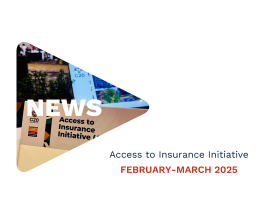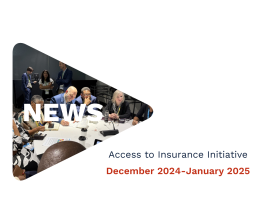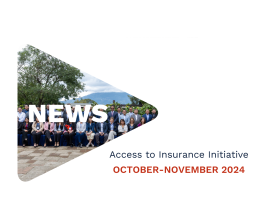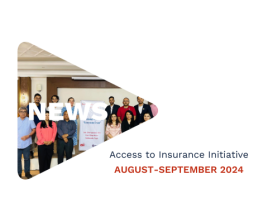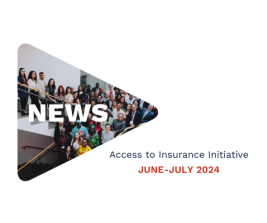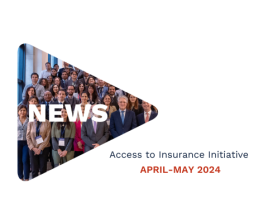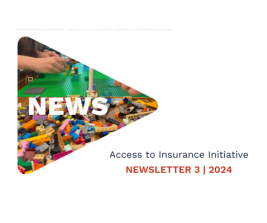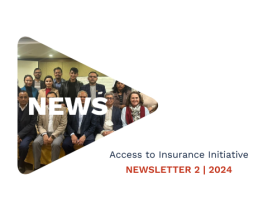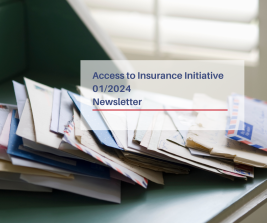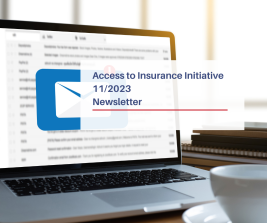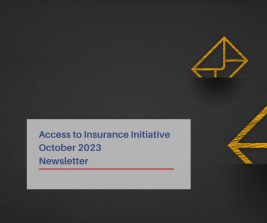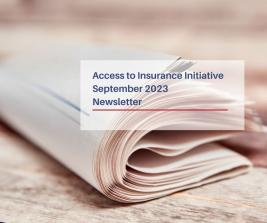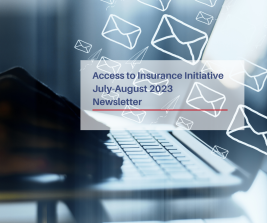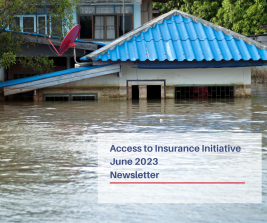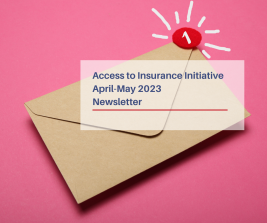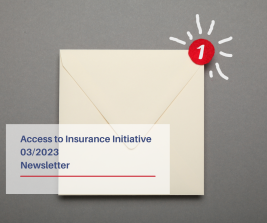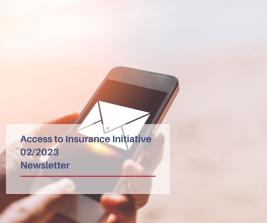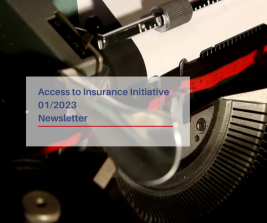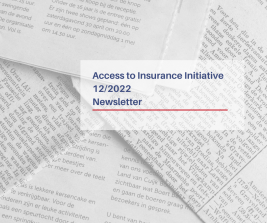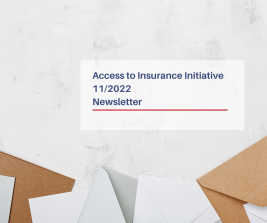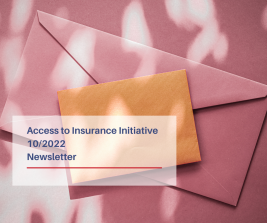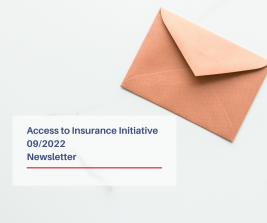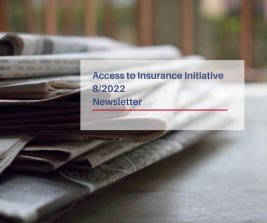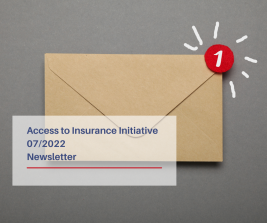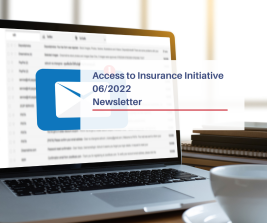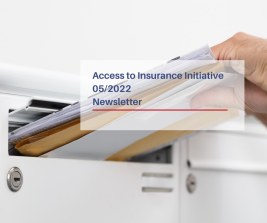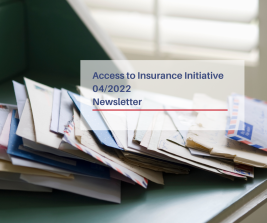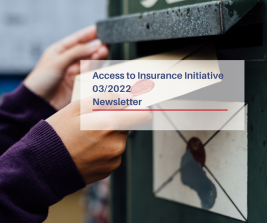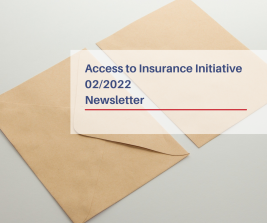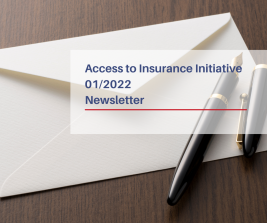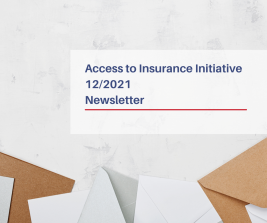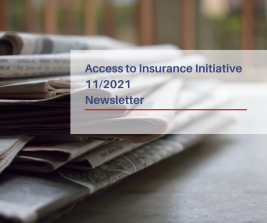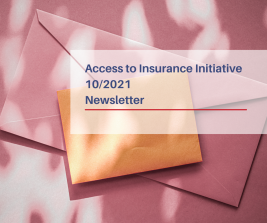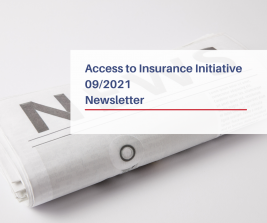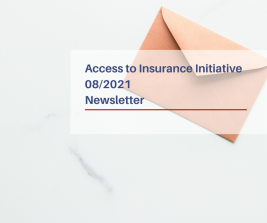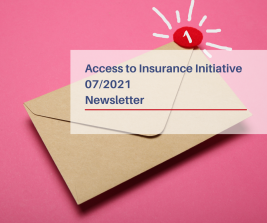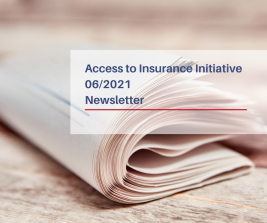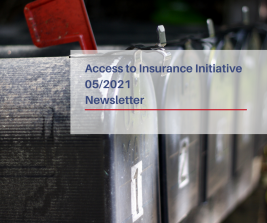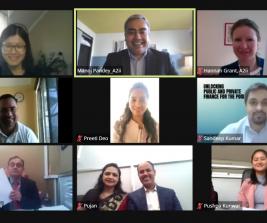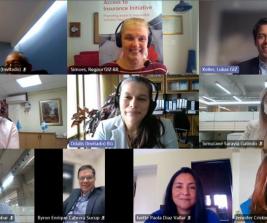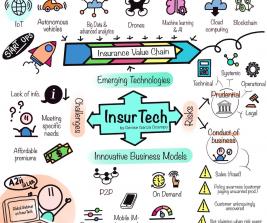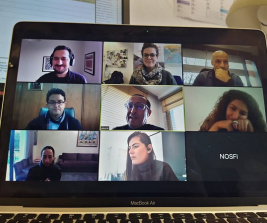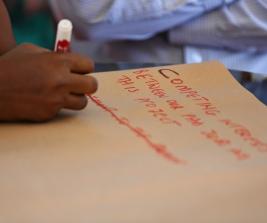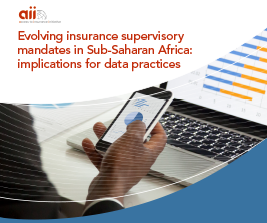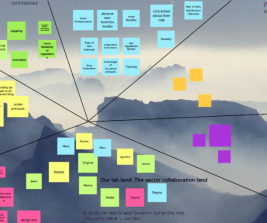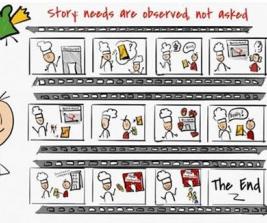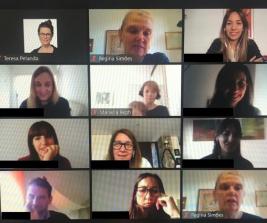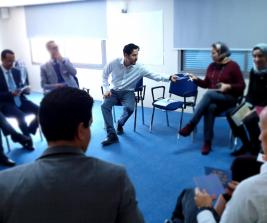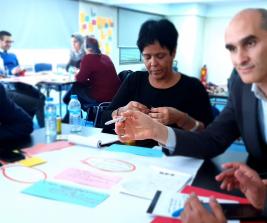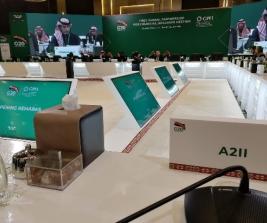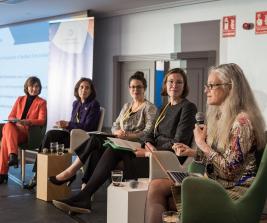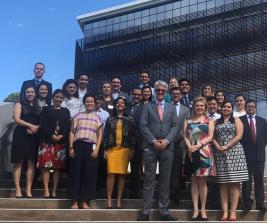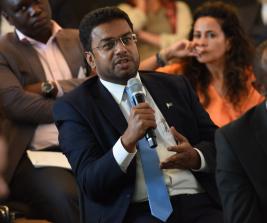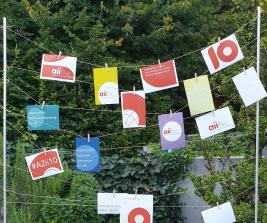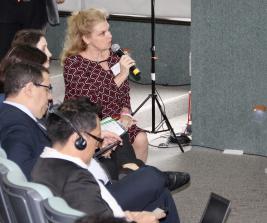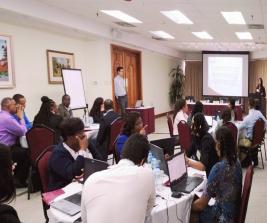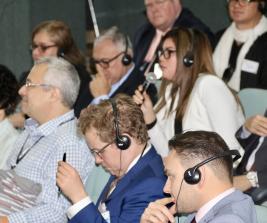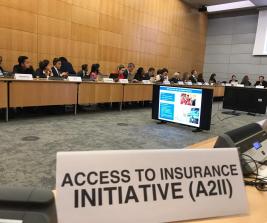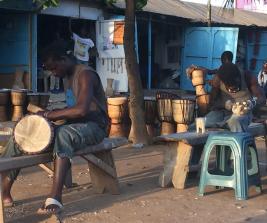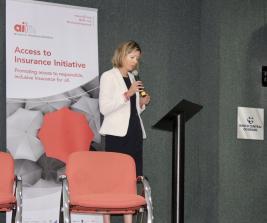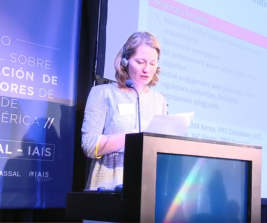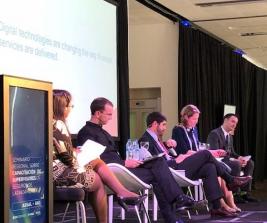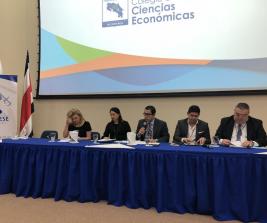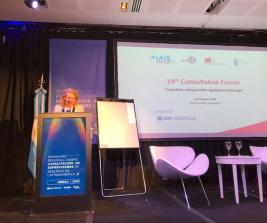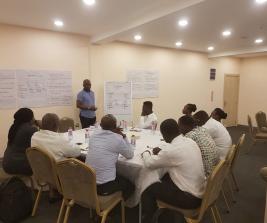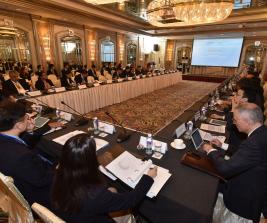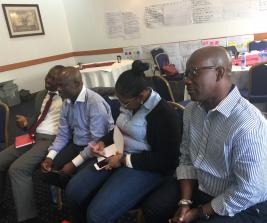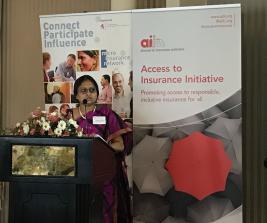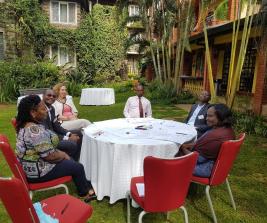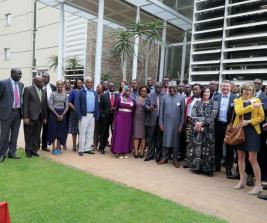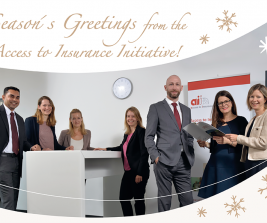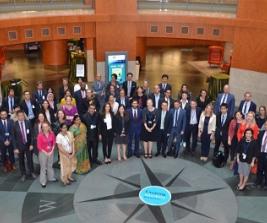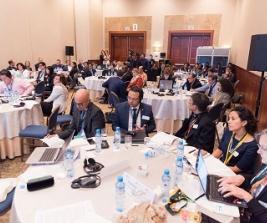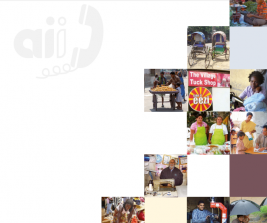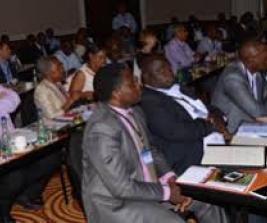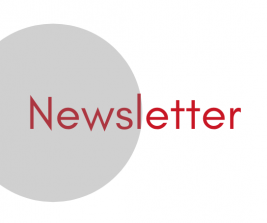A2ii Newsletter April-June 2025
Welcome! In this newsletter, we provide you with updates on the work of the A2ii, events and publications, and experiences and learning on inclusive insurance regulation and supervision across jurisdictions over the past month.
Follow us on LinkedIn and join the conversation on #inclusiveinsurance!
Subscribe to our mailing list to receive our newsletter in your inbox.
Navigation
News | iii-Lab Update | Upcoming Events | Publications | Recent Events | Blog | Index Insurance Insights | ICP Tool | Trainings | Useful Tools on Our Website
News
A New Chapter Begins for A2ii
Dear partners, colleagues, and friends,
After many inspiring and impactful years, the time has come to say farewell – as Executive Director and on behalf of Deutsche Gesellschaft für Internationale Zusammenarbeit (GIZ) as the host of the Access to Insurance Initiative (A2ii). On 1 July, 2025, CGAP will become the new host and convenor of the Access to Insurance Initiative (A2ii), taking over from GIZ.
Hosting the A2ii over the past 15 years has been a remarkable journey – shaped by continuous learning, close collaboration, and shared achievements . What started as a bold vision has evolved into a globally respected platform for advancing inclusive insurance regulation. A platform that worked with 186 jurisdictions around the world, enabling millions and millions of people to get access to inclusive insurance.
I am deeply grateful for the trust placed in us, for the dedication of the IAIS, our partners, and the broader community of stakeholders, and for the cooperative spirit that has defined this work. I would particularly like to acknowledge the longstanding leadership of Peter Braumüller as Chair of the Governing Council, as well as the steadfast support of Jonathan Dixon, Secretary General of the IAIS, and his team – especially Manuela Zweimüller and, of course, Conor Donaldson, as architect of the transformation.
Of course, our achievements would not have been possible without the generous and continuous support of our donors – in particular, the German Federal Ministry for Economic Cooperation and Development (BMZ) and the Dutch Ministry of Foreign Affairs (DGIS) – who believed in the mission of the A2ii and in the potential of empowered regulators to drive inclusive insurance.
Together, we have made meaningful progress: the voice of inclusive insurance is now stronger, regulatory frameworks have evolved, and the protection of vulnerable populations is high on the agenda in many countries. As our Regulation Map shows, 57 inclusive insurance regulations are currently in place, with another 13 under development. What a development, considering the six regulations on microinsurance back in 2009. The Cape Town Declaration - as our most recent initiative - has been set in motion with great support from around the world.
With the transition of A2ii to a new host, we mark an important milestone. The Initiative is strong, well-established, and ready for its next chapter. It is a moment of pride and gratitude – and of confidence that A2ii will continue to grow and thrive in this new next phase.
As we step away, we do so with full hearts and deep appreciation for all that we have built together. I wish the A2ii, its new host, partners, and the entire community continued success, bold thinking, and lasting impact in the years to come. I am sure we will meet again, as GIZ will remain your partner for international cooperation and technical advice in the sphere of inclusive insurance.
Under CGAP’s leadership, A2ii will place a strong focus on the Cape Town Declaration on Inclusive Insurance, A2ii’s innovation labs, and informing global policy discussions through the IAIS.
A2ii’s current collection of training tools and materials will now be supported and advanced by dedicated training institutes, including the Toronto Centre, Frankfurt School and the International Association of Actuaries in partnership with the IAIS.
To receive updates about A2ii and inclusive insurance, please subscribe to CGAP’s mailing list https://www.cgap.org/subscribe as we are unable to transfer your contact details due to privacy rules. A2ii’s LinkedIn account will continue to operate and you can also follow CGAP on LinkedIn and subscribe to CGAP’s YouTube channel.
Mathias Range
Executive Director A2ii.
Message from the Governing Council
Dear colleagues and friends of the A2ii,
The Newsletter at hand is a very special one.
The A2ii started with its first Newsletter mid-2013. The first edition – inter alia – informed about the Chairman’s remarks on new strategic direction for the Initiative, reported that 50 supervisors completed the A2ii/IAIS self-assessments on financial inclusion and informed about the Microinsurance Country Diagnostic in Nigeria.
Since then, the Newsletters kept you informed about all the main achievements by the A2ii and its partners. The Newsletters covered the whole range of A2ii activities, including the interactive map about inclusive insurance regulation, the Cape Town Declaration on Inclusive Insurance, the iii-Labs, the FeMa-Meter Tool, developments regarding Index Insurance, the A2ii/IAA/IAIS Actuarial Capacity Building Program and countless training events, capacity building initiatives and publications.
The A2ii will cease to exist in its current set-up on 30 June 2025. However, nearly all of the activities with which you have got familiar over the last years will continue, though in different structure and through other providers. It will be important that we will continue to generate and disseminate knowledge, build capacity, foster learning and dialogue, support implementation at the regional and national levels, and participate in global advocacy processes – for strengthening the capacity and understanding of supervisors and thus facilitate the promotion of inclusive and responsible insurance.
As we are in the midst of a significant transition process, it is key that we continue to believe in our vision – that more poor and vulnerable people have access to, and use of, affordable insurance appropriate for their needs.
I believe that we can be proud of what we have achieved together. Let me thank the Secretariat team and all colleagues who have made the A2ii’s success possible.
Peter Braumüller
Austrian Financial Market Authority
Chair of the A2ii Governing Council.
Message from the IAIS
I have had the privilege of being involved with the Access to Insurance Initiative (A2ii) since its very beginning, back in October 2009. First, as the inaugural Chair of the A2ii Governing Council, during my time as head of insurance supervision in South Africa. Then, in 2017, when I became Secretary General of the International Association of Insurance Supervisors (IAIS), an ardent supporter through the partnership between the IAIS and the A2ii.
The A2ii is the IAIS’ key implementation partner on financial inclusion. Over the years, I have witnessed the evolution of the A2ii – from its early days as a start-up project aimed at bringing together like-minded supervisors and partners with an interest in supporting inclusive insurance, to where it is today: a cornerstone of the insurance sector ecosystem. It has played a pivotal role in advancing financial inclusion in general, and inclusive insurance in particular. Today, it is globally acknowledged that fostering inclusive insurance markets is essential for achieving broader financial inclusion and advancing financial health. A remarkable achievement made possible, in no small part, by the hard work and collaboration fostered by the A2ii.
This journey of growth and impact would not have been possible without the unwavering support of a diverse range of partners who have contributed at every step. In particular, the steadfast backing of its host organisation, Deutsche Gesellschaft für Internationale Zusammenarbeit (GIZ), whose leadership and guidance have been invaluable. Additionally, the generous financial contributions from the Netherlands' Directorate-General for International Cooperation (DGIS) and Germany’s Ministry of International Cooperation (BMZ) have been instrumental in enabling the A2ii to fulfil its mission.
I feel certain that, in its next chapter, as part of CGAP, the A2ii will play an even more transformative role in helping to build inclusive and sustainable insurance markets that benefit vulnerable individuals and communities, protect enterprises and, more generally, support societal resilience. Thank you to all who were part of the journey so far, and I look forward to the exciting opportunities that lie ahead.
Jonathan Dixon
Secretary General
IAIS.
The Microinsurance Master accelerator program Update
In our ongoing mission to inspire and support insurance supervisors to promote inclusive and responsible insurance, the Access to Insurance (A2ii) supported the participation of 4 supervisors from the Nepal Insurance Authority (NIA), Securities and Exchange Commission of Pakistan (SECP), Reserve Bank of Malawi (RBM) and the Insurance and Pension Commission (IPEC) of Zimbabwe, in the 2025 edition of the Microinsurance Master accelerator program. The 2025 Microinsurance Master accelerator started on the 3rd of March with a two-week immersion in Kenya.
Following the two-week immersion in March 2025, the program is now well into the mentoring phase. The feedback received on the program so far suggests that all four scholarship recipients are finding the programme highly valuable. Each of the participants rated the Kenya immersion a 10/10 in terms of meeting their expectations and recommendation rating to peers.
One of the program participants Martin Magomero from the Reserve Bank of Malawi said that the immersion helped him realise they had been “sleepwalking all along”. While Sofia Bibi remarked that “Meeting policyholders and claimants was the most transformative experience. Interaction with end-users affirmed that although building trust through microinsurance takes time but once built, it is long-lasting...Insurers should not take claims lightly. They are not just expenses; they are investments for creating the best word of mouth and eventually the best advertising strategy for promoting their products and services. The most profound lesson I have learned is that customer-centric approach is not optional—it is essential. Sustainable solutions emerge when purpose meets profit, and that starts with understanding the real needs of the people we serve”.
According to Pujan Dhungel Adhikari, “The struggles faced by low-income people are strikingly similar around the world, while the types of risks they encounter may vary, the impact on their livelihoods and the aftermath of unexpected events are often nearly the same”
Through my participation in the Microinsurance Master Program, I realized that microinsurance is not just a product; it's a tool to transform lives disrupted by unexpected events. To make microinsurance an effective tool in supporting vulnerable people during times of need, it requires joint efforts from regulators, insurers, and the government. Partnerships with expert organizations and digital service providers further enhance its value, making microinsurance both easily accessible and an attractive investment for the future."
The consensus from all four participants was that the immersion had a profound impact on their understanding of inclusive insurance, thanks to the peer learning and the valuable insights from our hosts and practitioners in Kenya.
Here is a quick snapshot of the participants mentoring so far:
- Lloyd Gumbo (Zimbabwe)
is working with Anne Kamau (AB Enthios) on consumer education strategies, including the use of community agents and interactive tools to enhance engagement. - Martin Magomero (Malawi)
is developing a position paper with Andrea Camargo (WFP) identifying regulatory challenges and proposing solutions across the inclusive insurance value chain. - Pujan Dhungel Adhikari (Nepal)
is collaborating with Martina Wiedmaier on a paper analysing gaps in microinsurance regulation, based on interviews and data from both market actors and clients. - Sofia Bibi (Pakistan)
supported by Michael McCord (Microinsurance Center at Milliman), is developing a toolkit for disaster microinsurance, informed by focus group discussions held across several provinces.
New Training Programs for Insurance Supervisors by A2ii: New Inclusive Insurance Training (IIT)
The Access to Insurance Initiative (A2ii) has launched a series of free, self-paced training programs to enhance the skills of insurance supervisors. All programs are available on the Connect platform.
The new Inclusive Insurance Training (IIT) helps supervisors develop a deeper understanding of inclusive insurance principles and regulatory frameworks. It offers a flexible 12-hour learning experience, focusing on developing proportionate regulatory approaches to promote inclusive insurance while ensuring market stability and consumer protection. Supervisors will also learn to evaluate inclusive insurance policies in their jurisdictions, address emerging risks such as climate change and tech innovations. This program is designed for entry- to mid-level insurance supervisors. Available here.
iii-Lab Update
Outcomes of the 4th iii-lab
From October 2023 to October 2024, multistakeholder teams from Armenia, Nepal, and Senegal collaborated to devise and implement innovative solutions that fortify societal resilience against climate risks. While unified through the common topic of climate resilience in the agriculture sector, the solutions developed are unique in their approaches: a digital platform to build climate resilience among farmers by connecting them with insurance and climate-smart practices, a voice-based information system that delivers agriculture insurance and weather risk advice directly to farmers’ phones, and a parametric insurance product for fishers that uses geolocation and public-private partnerships to improve coverage and trust.
6 months later – what is the status of prototypes?
Team Armenia set out to address a persistent gap in awareness and preparedness among smallholder farmers facing climate-related risks such as hail and spring frost. While agricultural insurance products exist, uptake remains low due to limited knowledge, weak market access, and trust issues around claims handling.
To tackle these issues, the team developed ArmAgro - a web-based one-stop platform designed to empower farmers with critical information. The platform combines awareness-raising on the benefits of insurance with practical knowledge on climate-smart agriculture, developed in collaboration with Armenian universities and innovation hubs. The long-term vision: foster a new generation of climate-resilient farmers who are better equipped to manage risks and safeguard their livelihoods.
As one of the first initiatives of its kind in the country, ArmAgro has the potential to reshape how Armenian farmers engage with risk mitigation and climate resilience tools.
The team has encountered challenges in finding a suitable host for the platform’s implementation and maintenance, but ongoing discussions with a promising organization suggest a potential partner is emerging to take on this role.
Team Nepal focused on bridging the information gap around agricultural insurance for smallholder farmers, especially those in remote areas. Farmers often lack a clear understanding of available coverage options, face affordability challenges, and have limited exposure to digital technologies.
To respond, the team conceived Beema Sarathi - an Interactive Voice Response (IVR) system designed to deliver key messages via mobile phones. Farmers can call a dedicated number and receive pre-recorded, easy-to-understand information on agricultural insurance, disaster risks, and climate-smart practices.
The IVR will leverage the proven platform of Viamo, a global social enterprise dedicated to improving lives through mobile technology. Content development is underway, including gamified modules to boost engagement. Discussions are ongoing with insurers to ensure sustainability, and the IVR may later be expanded to additional user groups based on industry demand. Beema Sarathi is scheduled for launch in 2025 and represents a promising step toward digital inclusion and informed risk-taking in Nepal’s agricultural sector.
In addition, four organisations that started working together in the context of the iii-lab have initiated an alliance to pilot the country’s first satellite-based weather index insurance product aiming to provide protection to over 10,000 farmers against climate risks.
Team Senegal turned their attention to one of the country’s most exposed yet underserved groups: artisanal fisherfolk. The sector is highly vulnerable to extreme weather events, with existing insurance solutions falling short due to past implementation failures, trust issues, and regulatory complexity.
In response, the team is developing a parametric index insurance product tailored specifically to fishers. The prototype incorporates three major pillars: the integration of geolocation technology to track weather and fishing activities, the establishment of public-private partnerships to strengthen sector collaboration, and the rollout of targeted awareness campaigns through NGOs and fishers' associations.
Unlike previous efforts, this product is designed to streamline claims through objective, parameter-based triggers, increasing transparency and efficiency. The team is currently aligning the solution with meteorological data systems and exploring public sector funding opportunities. Engagement with key risk carriers such as SEN-RE is ongoing. If successful, this prototype could serve as a blueprint for broader insurance inclusion across West Africa’s fisheries.
Supervisors Successfully insuring against climate risks - Innovations from the 3rd Inclusive Insurance Innovation Lab
As vast segments of the low-income population and micro and small businesses remain excluded from financial protection against the impact of climate change, the Access to Insurance Initiative (A2ii), in partnership with the InsuResilience Global Partnership and Reos Partners, launched the third Inclusive Insurance Innovation Lab (iii-lab).
From October 2021 to October 2022, it brought together 75 key players from 𝗖𝗼𝘀𝘁𝗮 𝗥𝗶𝗰𝗮, 𝗚𝗿𝗲𝗻𝗮𝗱𝗮, 𝗭𝗮𝗺𝗯𝗶𝗮, 𝗮𝗻𝗱 𝗭𝗶𝗺𝗯𝗮𝗯𝘄𝗲 — all with one goal: to find real, practical insurance solutions that help vulnerable communities better prepare for climate risks. And the solutions they came up with in the lab are rather impressive.
Two years later, the outcomes of the iii-lab are beginning to take shape across the participating countries:
- In Costa Rica, “Fu-Turismo” was developed as an open-access web tool to raise awareness about climate change in the tourism sector.
- In Grenada, a parametric hurricane protection product was launched and was already triggered during Hurricane Beryl in 2024.
- In Zambia, over 420 individuals — including agricultural extension officers, civic leaders, market vendors, teachers, and university students — were trained to promote insurance literacy in their communities.
- In Zimbabwe, the “Farmer’s Basket” product, which combines parametric insurance with agricultural inputs, was introduced and currently serves over 17,000 farmers.
Further information, including stories and results from the third iii-lab, as well as a detailed overview of the solutions developed is available on the A2ii website, accessible here.
The iii-lab continues to inspire action beyond its official timeline, with several solutions already implemented or scaled. This reinforces our belief that 𝗶𝗻𝗰𝗹𝘂𝘀𝗶𝘃𝗲 𝗱𝗶𝗮𝗹𝗼𝗴𝘂𝗲 𝗮𝗻𝗱 𝗶𝗻𝗻𝗼𝘃𝗮𝘁𝗶𝗼𝗻 𝗰𝗮𝗻 𝗱𝗿𝗶𝘃𝗲 𝘀𝘂𝘀𝘁𝗮𝗶𝗻𝗮𝗯𝗹𝗲 𝗶𝗻𝘀𝘂𝗿𝗮𝗻𝗰𝗲 𝗲𝗰𝗼𝘀𝘆𝘀𝘁𝗲𝗺𝘀.
Recent events
A2ii at the AFD Conference on Financial Inclusion
On 3 April 2025, the Access to Insurance Initiative (A2ii) participated in the high-level conference Financial Inclusion: A Driver for Sustainable Growth and Inequality Reduction, hosted by the Agence Française de Développement (AFD) in Paris. The hybrid event brought together global experts, practitioners, and policymakers to examine the role of financial inclusion in advancing SDG 8 (Decent Work and Economic Growth) and SDG 10 (Reduced Inequalities).
Matthias Range, Executive Director of A2ii was among the speakers on the second roundtable, The Role of Financial Inclusion Policies in Stability, moderated by Cécile Lapenu, (Cerise+SPTF). The panel also featured: Abdou Samba (AFD Tunis), Ahmed Dermish (UNCDF), Ariadne Plaitakis (Gates Foundation), Djedjiga Kachenoura (AFD), Simon Priollaud (FiANACO) and Tatiana Alonso (CGAP).
During his input, Matthias Range discussed the key challenges and opportunities for inclusive insurance in the context of global instability. He emphasized that inclusive insurance often remains outside the scope of discussions on inclusive finance, which has tremendous impact – e.g. no Data through the Global Findex. Among the key challenges facing the insurance sector, he highlighted a range of issues including climate change, health crises, cyber threats, economic inequality, and shifting political dynamics.
At the same time, Matthias noted several positive developments, emphasizing that public policies are crucial in ensuring the proper supply of financial products, while stressing the need to find the right balance between under- and over-regulation. He also pointed out that the potential of integrated approaches is well-understood, and the increasing prevalence of embedded products, particularly in non-life insurance, is a positive trend. For example, Grab, a Southeast Asian app and platform ecosystem, sold over 100 million micro life and accident policies between 2019 and 2021. Matthias further highlighted the shift in the mindset of insurance supervisors, noting that A2ii, in cooperation with the IAIS, is supporting this change. Supervisors are expanding their focus beyond market stability and consumer protection to also include market development, fostering innovation, promoting data usage, and advocating for proportionate regulation, as outlined in the Cape Town Declaration.
In response to crises, he stressed the need for a systemic, holistic approach that involves collaboration between central banks, regulators, financial institutions, governments, and international organizations. Trust remains a cornerstone, and governments must actively engage with civil society, ensure transparency, and combat misinformation to maintain public confidence in systemic responses.
Beyond this roundtable, the conference featured discussions on access to financial services for excluded populations and strategies to reduce vulnerabilities to climate change through a just transition. These conversations reinforced the need for inclusive, adaptive, and forward-looking financial systems that respond to both immediate risks and long-term development goals. A2ii thanks the Agence Française de Développement (AFD) for organizing this impactful event, fostering crucial dialogue on financial inclusion and its role in building a sustainable future.
A2ii at the 12th National Financial Education Week in Brazil, 14 May 2025
As part of the 12th National Financial Education Week in Brazil, the event “Education as a Tool for the National Insurance Access Policy” took place on May 14th at the Central Bank Auditorium in Rio de Janeiro. The in-person event was an initiative of the Brazilian Financial Education Forum (FBEF), and this year’s central theme was: “Financial Education for Children and Young People: Preparing Society for Informed Choices.” Attendance was restricted to guests of the “National Insurance Access Policy” Working Group and staff of the Superintendence of Private Insurance (Susep).
The aim was to discuss financial education as a tool for national policy, given that this was the topic most frequently mentioned by the working group members as an essential element for increasing access to insurance. Julia Normande Lins, Director of Susep, opened the event and presented the main findings of the Working Group Report. Regina Simões, the A2ii Regional Coordinator for Latin America, participated as a moderator in the panel on “The Effects of Inequalities,” alongside speakers Ana Rita Petraroli (Petraroli Advogados Associados) and Valéria Chaves (Sou Segura).
A2ii at the Second Global Partnership for Financial Inclusion (GPFI) Meeting, 19-20 May 2025, Pretoria, South Africa
The A2ii, represented by Asmaa Jabri, was present at the second plenary meeting of the Global Partnership for Financial Inclusion (GPFI), held under South Africa’s G20 Presidency in Pretoria held from the 19th to 20th May.
During the GPFI plenary, Ms. Jabri on behalf of A2ii, highlighted the importance of considering inclusive insurance not only as a financial inclusion product or service, but also as tool and a lever for financial inclusion and a key enabler of the SDGs.
Furthermore, following her intervention on the first day of the plenary, Co-Chair Magda Bianca from the Central Bank of Italy emphasized to the audience that insurance is becoming increasingly important in the financial inclusion agenda.
A2ii at the Launch of the Global Shield against Climate Risks Support
The General Superintendency of Insurance (SUGESE) and the Ministry of Finance of Costa Rica, in collaboration with the Global Shield Secretariat, held the Launch Event for the Global Shield against Climate Risks Support Application on June 12, 2025. The A2ii was represented at this virtual event by Regina Simoes.
The submission of this application marks a decisive step toward strengthening the country's financial protection against disasters and extreme weather events through innovative and sustainable solutions. It is worth noting that the initiative was supported by the A2ii in its initial phase.
This progress will allow Costa Rica to more effectively protect the most exposed people, communities, and productive sectors.
FeMa-Meter Workshop | 5-6 May, Kathmandu, Nepal
On the 5th-6th May, the Access to Insurance Initiative (A2ii) supported the Nepal Insurance Authority (NIA) in hosting a two-day workshop in Kathmandu focused on advancing gender-inclusive insurance through the use of sex-disaggregated data. This landmark event marked Nepal as the first country globally where a regulator has deployed the FeMa-Meter tool, a cutting-edge instrument designed to capture sex-disaggregated data across the insurance sector.
Over the course of the 2-day event, A2ii and NIA facilitated in-depth discussions with key stakeholders from across the insurance ecosystem. Together, participants reviewed and analysed data drawn from both life and non-life insurance portfolios, as well as metrics on organisational diversity. These conversations spotlighted areas where women remain underserved and revealed tangible insurance product design opportunities to address existing gaps. The workshop also provided a platform for sharing best practices in gender data collection, ranging from the separation of micro and traditional insurance data to the empowerment of female agents at the community level, to the piloting of new IT tools aimed at making gender data capture more accurate and cost-effective.
To build on this momentum, a half-day roundtable was convened, bringing together over 30 leaders from across Nepal’s insurance industry. Participants agreed on a set of shared priorities to guide the sector forward. These include strengthening sex-disaggregated reporting, promoting the development of insurance products that meet women’s specific needs, investing in gender-sensitive workplace policies, and ensuring women have access to leadership opportunities and targeted professional development.
A2ii extends its sincere appreciation to the Nepal Insurance Authority and its industry partners for their insight, collaboration, and commitment to meaningful, long-term change.
Looking ahead, A2ii will work closely with local stakeholders to co-develop an implementation template that translates these shared priorities into practical action. Supporting insurers as they adopt disaggregated reporting as a standard practice is a critical step toward more inclusive, effective insurance systems. When women are fully included, the sector is better equipped to innovate, reach new markets, and strengthen resilience across society.
Index Insurance and Climate Risk Dialogue
On 7 May 2025, the Access to Insurance Initiative (A2ii), in partnership with the International Association of Insurance Supervisors (IAIS), hosted a Public Dialogue on index insurance and climate risk, bringing together regulators, development partners, and industry representatives from Asia and Africa. The discussion focused on regulatory developments, product design, and innovative approaches to enhancing climate resilience through index-based insurance solutions.
In his opening remarks, Conor Donaldson (IAIS) emphasized the importance of such dialogues in advancing inclusive insurance and closing protection gaps. He highlighted the relevance of parametric insurance for underserved markets and aligned the topic with the IAIS’s 2025–2029 Strategic Plan, which prioritizes insurance's role in building societal resilience.
Matthias Range (A2ii) welcomed participants, noting the critical role of index insurance in protecting vulnerable communities and recognizing the progress in product innovation over the past decade.
The event featured a presentation by Asmaa Jabri (A2ii Secretariat), who explained the mechanics, benefits, and limitations of different index insurance models, including indemnity-based, weather derivatives, and index-based products, with a focus on addressing basis risk.
Key contributions included:
• Pujan Dhungel Adhikari (Nepal Insurance Authority), who outlined Nepal's efforts to develop a regulatory framework for index insurance and improve climate risk data accessibility.
• Andrea Camargo (World Food Programme), who shared lessons from pilot projects in The Gambia and Ethiopia and discussed demand- and supply-side challenges, as well as the role of technology, such as satellite data and digital payments.
• Gloria Womitso (Africa Risk Capacity), who addressed barriers to adoption, including perceptions of parametric insurance as a niche product, and called for stronger collaboration, capacity building, and integration with national systems.
Read the full report in the event page
Dialogue on the Importance of Gender-Disaggregated Insurance Data
The Access to Insurance Initiative (A2ii) and the International Association of Insurance Supervisors (IAIS) jointly organized the Dialogue on the Importance of Gender-Disaggregated Insurance Data on 22nd May, which was attended by 62 participants from 12 countries, including insurance supervisors and industry representatives.
Carlos López Moreira, Senior Policy Advisor at IAIS, and Teresa Pelanda, Innovation Lab Leader at A2ii, gave the opening remarks.
In the first session, Cinthya Acuña Solano from the Superintendency of General Insurance (SUGESE), Costa Rica, and Jennifer Cristina Pérez Garrido from the Superintendency of Banks (SIB), Guatemala, shared case studies from their jurisdictions, reporting on findings and lessons learned from using the FeMa-Meter, an MS Excel-based toolkit for collecting and reviewing gender-disaggregated data that compares differences between men and women across a range of indicators.
They were followed by Natalia López from Rio Uruguay Seguros (RUS) who provided an industry perspective, explaining why RUS decided to voluntarily implement the FeMa-meter and what their experience has been like. At the end, an interactive discussion took place, moderated by Regina Simões, A2ii Regional Coordinator for Latin America.
Both supervisory and industry representatives agreed that the FeMa-Meter is a very simple and easy-to-use tool that provides instant results and valuable insights into the path forward for gender strategies to be adopted, whether as a country policy or at the market level.
The complete recording of the dialogue, in Spanish, is available on the A2ii website and can be accessed here.
Dialogue on the FeMa-Meter Tool, Nepal
On 12 June 2025, the Access to Insurance Initiative (A2ii) and the International Association of Insurance Supervisors (IAIS) jointly organized a public dialogue on the FeMa-Meter tool titled “From Data to Action: Insights from Nepal”, which was attended by 35 participants from 9 countries. The dialogue focused on the FeMa-Meter tool and its potential to enhance gender-inclusive insurance policymaking and regulation in Asia.
Matthias Range, A2ii’s Executive Director, and Milena Kozomara, A Senior Advisor at A2ii, gave the opening remarks. In her introduction, Milena emphasized the importance of better data for stronger actions in inclusive insurance and closing the gender protection gap. On the other hand, Matthias highlighted the global issue of women being underserved by insurance markets due to social-cultural barriers, limited asset ownership, and digital and financial inclusion. He also emphasized the role of insurance supervisors and regulators in bridging this gap by promoting data-driven approaches to identify and correct disparities.
In the first presentation, Pushpa Kunwar from the Nepal Insurance Authority (NIA) presented her work on gender inclusivity in the insurance sector. She shared insights from their data collection (using the FeMa-Meter) and analysis, highlighting the gender disparities in life and non-life insurance sectors in Nepal. She explained the data collection process from 35 insurers, including life, non-life, micro life, and micro non-life insurers, to understand gender inclusivity in insurance access and workforce composition. She then highlighted the gender disparities found in the life and non-life insurance sectors, emphasizing the need for further analysis and interventions to address these disparities.
The presentation was followed by a panel discussion, moderated by Manoj Pandey, which included insights from Rena Rijal, DCEO of United Ajod Insurance and Nirmal Shrestha, Chief Executive Officer of Metlife Nepal, on the challenges and opportunities for improving gender inclusivity in the insurance sector. They discussed the importance of creating a gender-sensitive workplace, developing women-centric products, and providing training and development opportunities for women. Rena Rijal and Nirmal Shrestha shared their perspectives on the importance of gender inclusivity in the insurance sector. They emphasized the need for creating a safe and supportive work environment for women, developing women-centric products, and providing training and development opportunities for women to rise to leadership roles.
The complete recording of the dialogue is available on the A2ii website and can be accessed here.
FeMa-Meter Tool
Globally, women constitute the majority of the uninsured population and are underrepresented in insurance policymaking and supervision, which exacerbates their access challenges. To address these issues, A2ii launched the FeMa-Meter on 8 March.
This toolkit collects and reviews sex-disaggregated data to analyse gender differences in insurance indicators. Piloted in Argentina, Lesotho, Pakistan, and Zambia, it has proven to be an effective tool for collecting sex-disaggregated data.
With an intuitive interface, users can input data and generate insights swiftly. To access the FeMa-Meter, visit its dedicated website and its accompanying training module. Join us in advancing gender equality and improving insurance access through data-driven approaches.
Index Insurance Insights
Learn about index insurance in our free training and obtain the A2ii-UNCDF Certificate on Index Insurance for Supervisors. Exclusively designed for insurance supervisors, this certification offers comprehensive insights into index insurance mechanisms. Ready to take the next step? Enrol now on A2ii’s learning platform, Connect.A2ii.
For all other stakeholders not in supervisory roles, access our open version of the training on our website.
Insurance Core Principles Self-Assessment Tool
Have you tried the SAT tool yet? The Insurance Core Principles Self-Assessment Tool is a joint initiative of the IAIS and the A2ii designed to facilitate the assessment of the level of observance of the ICPs. Leveraging the analytical framework of the Peer Review Process, it empowers supervisors to evaluate adherence to these essential principles.
How it works:
Supervisors can access the tool through the dedicated platform. Once on the platform, they can navigate through a series of questionnaires tailored to each ICP.
The questionnaires are crafted to cover various aspects of each principle, providing a comprehensive evaluation framework. Supervisors can respond to these questions based on their assessment of their jurisdiction’s practices and policies.
Upon completing a questionnaire, supervisors receive immediate feedback. These results offer insights into the level of observance of the assessed ICP, enabling supervisors to identify strengths, weaknesses, and areas for improvement.
We encourage all supervisors to explore this resource and its potential to drive positive change within the insurance landscape.
Trainings
Self-directed training
Supervision of climate-related risks in the insurance sector
Applying a gender lens to inclusive insurance
How to conduct a rapid gender diversity assessment
Index Insurance Training for All Stakeholders
Are you an insurance supervisor? Then join Connect.A2ii - our learning platform restricted to supervisors offering free and certified courses and an opportunity to learn from peers.
Useful Tools on Our Website
Inclusive Insurance Regulations Map
The interactive map incorporates data about existing inclusive insurance regulation and regulation which supports inclusive insurance sourced through A2ii's research, work and interaction with supervisory authorities worldwide.
ICP Self-assessment Tool
The tool is intended to help supervisors assess the level of observance of the Insurance Core Principles (ICPs).
Supervisory KPIs Lexicon
Interactive, searchable directory of KPIs for insurance supervisors across four pillars: prudential soundness, market conduct, insurance market development and the Sustainable Development Goals.
Insurance and the Sustainable Development Goals (SDGs)
The SDG pages include resources on the importance and the role of insurance across nine SDGs: 01 No Poverty, 10 Reduced Inequalities, 02 Zero Hunger, 03 Good Health and Well-being, 05 Gender Equality, 08 Decent Work and Economic Growth, 09 Industry Innovation and Infrastructure, 13 Climate Change and 17 Partnerships for the Goals.

